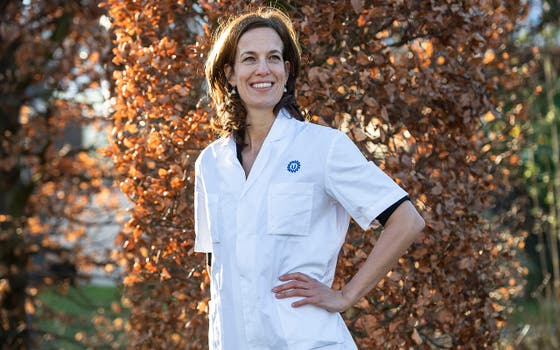Further insights into pregnancy-associated breast cancer

Pregnancy-associated breast cancer is a different disease than breast cancer in non-pregnant women. Pregnant women often have a larger tumor and a more aggressive type of breast cancer upon diagnosis, making their prospects less favorable. This is evidenced by the research of medical oncologist Britt Suelmann at UMC Utrecht. Tuesday March 29, Britt obtained her PhD on this research.
About 30 pregnant women are diagnosed with breast cancer each year in the Netherlands. There have been significant improvements in the treatment of pregnancy-associated breast cancer in recent years. We now know which treatments against breast cancer are safe for pregnant women and for the unborn child. This has resulted in more treatment options for pregnant women with breast cancer. However, it is still not clear how the disease develops and what the effect of the pregnancy is on the breast cancer.
During her PhD research, medical oncologist Britt Suelmann of the UMC Utrecht aimed to gain more insight into these aspecta. “Pregnancy-associated breast cancer is a very upsetting diagnosis,” Britt explains. “Most women do not think that something like this can happen to them. Yet dozens of women are diagnosed each year.”
Greater awareness of pregnancy-associated breast cancer
On average, pregnant women have a larger breast tumor than non-pregnant women of the same age. The cancer is also more likely to have spread to the lymph nodes in pregnant women. As a result, their chances of survival are less favorable.
Britt: “I find it important to raise more attention and awareness of this disease. Pregnant women are a vulnerable group. They should feel that they can ask for help if they think that something is wrong.”
Largest study into pregnancy-associated breast cancer worldwide
During her PhD research, Britt examined the characteristics of the breast tumors of 744 Dutch women diagnosed with breast cancer during their pregnancy, or up to 6 months after the birth. These data were obtained from a Dutch pathology database, which stores information about women who received this diagnosis between 1988 and 2019.
Britt based her research on various pathological characteristics of the breast tumors; these are anonymous data. She compared the data of the breast tumors of the pregnant women to breast tumors of women of the same age who were not pregnant. This is the largest study to date into pregnancy-associated breast cancer worldwide.
Pregnancy-associated breast cancer is a different disease
Britt’s research reveals that pregnancy-associated breast cancer is a different type of cancer than breast cancer in non-pregnant individuals. In pregnant women, 2 types of breast cancer are more common: HER2-positive breast cancer and triple-negative breast cancer. These types are more aggressive, which means that the cancer cells grow and divide more quickly and are more likely to metastasize. This makes these types of cancer more difficult to treat.
One aspect highlighted by Britt’s research is that hormone-sensitive breast cancer – the most common type of breast cancer – is in fact less common in pregnant women. “A woman’s body produces lots of hormones during pregnancy. These hormones appear to have a different effect on the development of breast cancer. They cause the cancer cells to grow even more quickly,” she explains.
Analysis of breast tumors per trimester of the pregnancy
Another unique feature of Britt’s research is that she categorized the tissue characteristics of the breast tumors according to the trimesters of the pregnancy. A pregnancy consists of 3 trimesters lasting 3 months each. She also analysed the tumor characteristics of women after birth, distinguishing between women who were breastfeeding or formula feeding.
Britt: “The research reveals that breast tumors discovered in the second and third trimester have different characteristics and are more aggressive than tumors discovered during the first trimester. Tumors were also more aggressive in women who were breastfeeding. The survival rate for these groups was lower.”
DNA research on breast tumors during pregnancy
Britt also studied the DNA of several triple-negative breast tumors. This revealed that the DNA of the breast cancers of pregnant women contained different mutations (errors in the DNA) than the tumors of the non-pregnant women. Britt concludes that the DNA of breast tumors in pregnant women is also different and should therefore receive a different treatment at DNA level. “We are going to expand this DNA research, so that we can gain a better understanding of which mutations are involved and how these are best treated,” she explains.
Recommendations for the treatment of pregnancy-associated breast cancer
In summary, Britt’s research demonstrates that pregnancy-associated breast cancer is a disease with varying characteristics. It is very important to determine for each woman the type of breast cancer that she has and to optimize the treatment plan accordingly. The trimester of pregnancy in which the tumor is diagnosed and whether the woman is breastfeeding also provides important information.
Britt: “These data allow us to tailor the treatment of every woman with pregnancy-associated breast cancer. This will hopefully improve the outcomes for this vulnerable patient group.”
Information about the thesis
Britt Suelmann obtained her PhD on Tuesday, March 29, in the Faculty of Medicine of Utrecht University. Her supervisors were prof. Paul van Diest and Prof. Elsken van der Wal, with co-supervisor Carmen van Dooijeweert. The thesis is entitled: Towards personalized care in pregnancy-associated breast cancer; the importance of the clinicopathologic profile.
Further information and useful links
- Profile page of Britt Suelmann
- How can you recognise pregnancy-associated breast cancer? Read more about this on www.kanker.nl (in Dutch).
- Stichting Ster(k): association for women with pregnancy-associated cancer
- Breast Cancer Association of the Netherlands, the patient organisation for everyone affected by breast cancer
